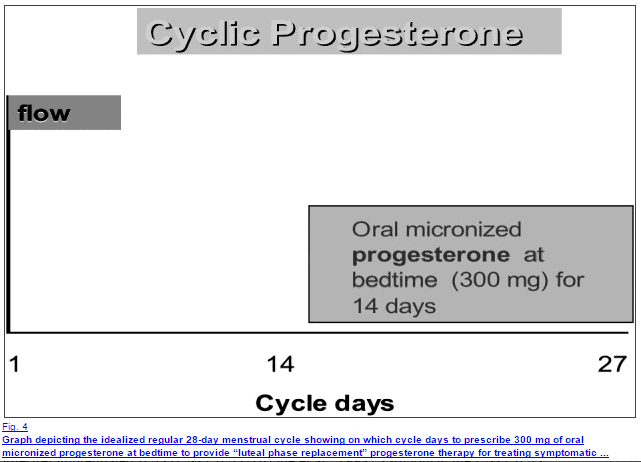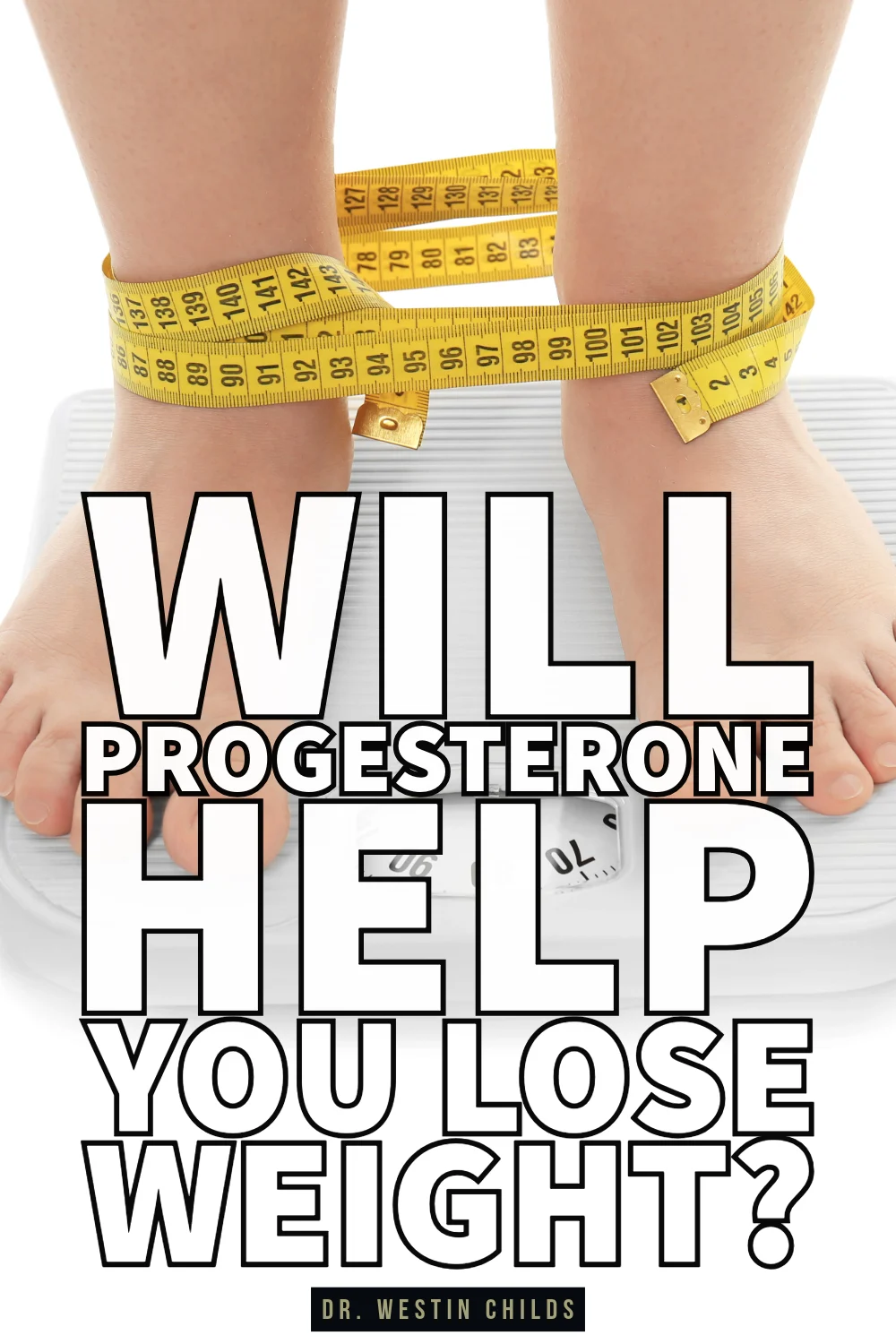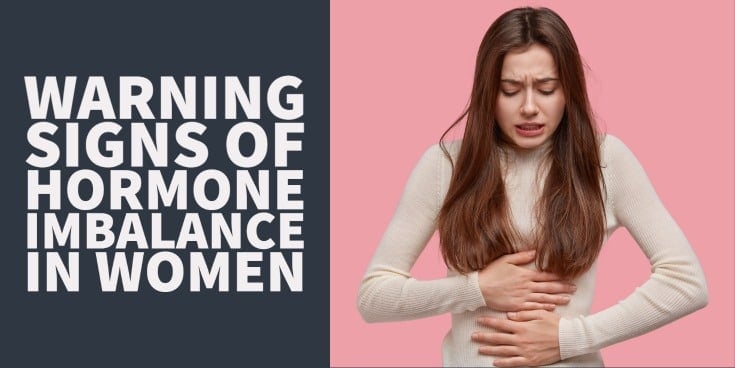When you think of progesterone most of us are conditioned to think that it causes weight loss.
But the truth is that progesterone can cause both weight loss and weight gain, depending on the situation of who is using it.
Not only that but how you take progesterone and at what dose may determine if it helps with weight loss or weight gain.
Progesterone and Your Weight
Healthy and normal levels of estrogen and progesterone are required for a woman to maintain a normal weight.
The problem comes from understanding this balance and how to achieve it using supplements and creams.
You can think of estrogens (including estrone, estradiol, and estriol) as growth hormones.
Estrogens make your cells bigger, whether that be your fat cells, uterine cells, or breast tissue.

Progesterone, on the other hand, helps counteract these effects of estrogen (1).
In this way, progesterone is a natural way that your body balances estrogen levels.
So even though most women gain some weight during their menstrual cycle, that weight is lost once your hormones even themselves out.
So how does weight fit into this picture?
What I’ve just described is how the system is SUPPOSED to work, but that doesn’t mean that it works this way in every person.
Most women (at least in the United States) have trouble with too LITTLE progesterone and too MUCH estrogen.
This results in an imbalance known as Estrogen dominance, meaning you have too much estrogen relative to progesterone.
Most women know if they fall into this category because they present with symptoms like these:
- History of endometriosis
- History of fibrocystic breast disease
- History of PMS or PMDD
- Severe depression or anxiety around menstruation
- Perpetual weight gain surrounding menstruation
- Hormonal acne that changes with your menstrual cycle
- History of migraines related to your hormones
- Breast tenderness, heavy menstrual cramps, or mood swings
If you fall into any of the categories above then chances are high that you do indeed have an imbalance of estrogen to progesterone in your body.
You can find more information about how to treat these symptoms using supplements in this post.
Does that mean that you should automatically take progesterone to balance the high estrogen?
Not necessarily, and this is what gets people into trouble.
The answer to high estrogen is not to dramatically increase your progesterone level.
In fact, taking progesterone if you have normal levels of progesterone, to begin with, is what causes weight gain in many people.
Another important factor has to do with how you take progesterone and how MUCH you take (more on this below).
You have to consider that each person
Most of the weight gain from progesterone comes from excessive or high doses.
But how do you know if you are getting too much progesterone?
Follow the symptoms!
Symptoms of excess progesterone in your body:
- Weight fluctuations(usually mild weight gain of 5-10 pounds)
- Drowsiness
- Depressed feeling but not overt depression
- Slight dizziness
- Waking up groggy or “on edge”
- Bloating
- Sense of physical instability
- Feeling of a spinning sensation
- Discomfort or pain in the legs
- Water retention
- Anxiety or just feeling “tense”
- Changes to libido(usually decreased sex drive)
- Not feeling like yourself
These symptoms indicate that you have TOO much progesterone in your body, and if you are taking progesterone and experiencing these symptoms then chances are you might also be gaining weight.
This weight gain may stem from the dose you are taking, HOW you are taking the medication or the frequency with which you are taking progesterone.
It doesn’t necessarily mean that you need to stop taking the medication ASAP.
Let’s take a closer look at how to make sure you are taking progesterone correctly:
How you take progesterone matters
Remember there are really only two ways you should be using progesterone:
- Bioidentical progesterone cream
- Bioidentical oral progesterone (Prometrium)
You should NOT confuse these types of progesterone with synthetic or fake pharmaceutical forms of progesterone that most physicians prescribe.
Pharmaceutical companies don’t like to make bioidentical hormones because they can’t patent the medication and therefore they can’t make very much money.
Instead, they slightly alter the progesterone molecule and brand it with a new name.
But you want to stay away from these types of progesterones (called progestins or progestagens) because they are NOT metabolized in the same way as normal progesterone.
These synthetic and fake types of progesterones are responsible for a lot of weight gain that many people experience as well.
In fact, some studies have shown that some women may gain several pounds (2) while taking progestin-only birth control medications.
So we know that taking fake and synthetic progesterone is out of the question, but what about taking bioidentical progesterone pills? Is that okay?
Whenever possible it’s always best to mimic nature when you are replacing hormones.
For progesterone that means the following:
- Making sure that any progesterone you take bypasses the first metabolism from the liver (normally, progesterone is secreted straight into your bloodstream) -> this means a preference for creams/gels instead of oral progesterone
- Taking progesterone when it would naturally be high during the menstrual cycle (during the last 2 weeks or the luteal phase)
- Avoiding synthetic formulations of progesterone (use only bioidentical forms)
- Taking only enough progesterone for YOUR body (the dose that each person needs will be different)

If you aren’t following these guidelines, even if you are taking bioidentical progesterone, your dose may be simply too high or you may be taking it the wrong way.
It’s important to discuss these nuances because it might just be that progesterone isn’t your problem, but it’s more about how you are taking it.
We will go over in detail how to use progesterone below, but for now, let’s talk about who should seriously consider using progesterone for weight loss.
Who should use Progesterone for Weight Loss:
#1. Patients with low serum progesterone levels
This should go without saying, but if you have LOW progesterone then you are a great candidate for progesterone replacement therapy.
As long as you use bioidentical progesterone therapy with a transdermal application, at the right dose, there is a very low chance that you will have negative consequences such as weight gain.
But how do you know if you have low progesterone?
It’s actually quite easy to test your blood levels of progesterone. All you need to do is ask your doctor for a “serum progesterone” blood test.
Make sure you get tested on days 19-21 of your menstrual cycle (assuming a 28-day cycle).
If your serum progesterone is low when you test on these days then you are likely not creating ENOUGH progesterone or you are having anovulatory cycles.
This is also where things start to get interesting:
Progesterone levels obviously fall off dramatically during menopause (after ovulation ceases) but what you might not have realized is that progesterone naturally reduces around age 35 as well.

Both estrogen and progesterone decline around this time, but progesterone declines more rapidly.
This process leaves a relatively high concentration of estrogen relative to progesterone and this is why many women begin to suffer from the symptoms of estrogen dominance.
Starting at age 35 you may consider using progesterone IF your levels are low.
#2. Women who are menopausal
The second reason to use progesterone is due to a deficiency from menopause.
Once a woman hits menopause (whether that be from chemicals, hysterectomy, or the course of time) she is no longer ovulating.
Because ovulation is the biggest source of progesterone in women, the reduction of ovulation almost always results in VERY low progesterone levels.
It’s worth pointing out here that you can hit menopause early if you undergo removal of your ovaries due to surgery, or if you take certain medications (like those for breast cancer).
Both of these conditions create an early menopause-like syndrome which results in near zero progesterone levels.
The problem with menopause is that while progesterone levels drop to nearly zero, estrogen doesn’t always follow that trend.
Why?
Because your body can take androgens (DHEA and testosterone) and turn those into extra estrogen through your fat cells.
This process is known as aromatization (3) and it occurs in both men and women.
This creates a very interesting and troublesome scenario in many menopausal women:
If they have extra fat on their body they may create much more estrogen than normal while they have virtually zero progesterone.
This may, in part, help explain why menopausal women tend to gain weight (on average about 15 pounds).
The bottom line?
If you are menopausal you can almost guarantee that your progesterone level is very low and replacing those low levels may help with weight loss.
#3. Women with Estrogen Dominance should consider it
We’ve been talking about this idea of having too much estrogen during menopause but what about other women? Do they deal with the same issue?
And the answer is yes.
The following conditions may result in excess estrogen AND low progesterone levels:
- PCOS or being on the PCOS spectrum
- Insulin resistance, diabetes (either type I or type II), or issues with blood sugar
- Hypothyroidism
- Obesity or weight gain from any cause
- Eating disorders, binge eating, emotional eating, etc.
- High stress or a history of adrenal problems
- Exposure to xenoestrogens or endocrine-disrupting chemicals (4)
These conditions result in a scenario where estrogen levels remain high while progesterone levels may be artificially lower than normal.
Women who fall into any of these categories may benefit from using progesterone ASSUMING their levels are low.
You might also notice that many of these conditions are associated with weight gain in some form.
The use of progesterone in this setting may ultimately help with weight loss, but don’t count on it.
Also, do remember to check your serum progesterone level prior to supplementing as sometimes serum progesterone levels (even in these conditions) may be normal or high.
It’s possible to have more than 1 hormonal abnormality going on at once.
#4. Women with hypothyroidism should consider using Progesterone Cream
Next on the list is worth mentioning a second time:
Women suffering from hypothyroidism.
Why?
First of all, hypothyroidism is very common, and worse than that it is misdiagnosed by many physicians.
This creates a scenario where many women are walking around with hypothyroidism and low progesterone without even knowing it.
In addition, thyroid hormone plays a special role in helping maintain normal progesterone levels and normal ovulation.
Low thyroid hormone results in decreased ovulation and therefore decreased progesterone.
This relationship helps explain why women with hypothyroidism suffer from infertility and difficulty maintaining pregnancy until they are treated.
You can see the complete list of thyroid symptoms in this post where you can also learn how to be properly tested.
#5. Women with severe fatigue or adrenal fatigue
Lastly, there is a strong connection between cortisol, stress, and progesterone.
The unifying theme here is that these hormones all interact with one another and therefore must ALL be considered if you have a hormonal imbalance in your body.
The connection between stress and progesterone is sinister because it is often ignored or missed.
High levels of stress lead to high levels of cortisol.
As you can see from the diagram below, cortisol has an impact on multiple systems in your body (pretty much every cell):

This impact extends to your sex hormones like progesterone and estrogen.
Higher cortisol levels initially may stimulate high progesterone levels (leading to weight gain), and if the stress is maintained it may ultimately lead to low progesterone levels (5).
You’ve seen this relationship at play if you’ve ever had your cycle delayed or altered due to high-stress levels (relationship problems, finals at school, etc.).
The point is to make sure you address your adrenals with certain supplements which can dramatically improve your progesterone levels.
You can find out how to treat your adrenals and lower stress levels in this guide.
Cream vs Oral Progesterone (Prometrium)
If you decide to use progesterone (because you fall into the categories listed above) there are 2 options for you that are both bioidentical.
Your default should be to use the cream FIRST and then do a trial of the oral progesterone if the cream fails (some people just don’t absorb as well as others).
Who should use progesterone cream:
- Those who have not tried progesterone previously
- Those who do not tolerate the cream or have a hard time finding their optimal dose
- Those who can’t find a physician willing to prescribe them oral progesterone
- *Note: Progesterone cream can be purchased over the counter without a prescription but oral progesterone requires a prescription.
How to Supplement with Bioidentical Progesterone
- If menstruating: Use 20-40mg per day on days 14-28 of your cycle (the latter half of the month)
- If in menopause: you can use 20-40mg per day either 6 days per week (with rest on the 7th) or 26-28 days per month (with 1-3 days off per month)
- Make sure to monitor your symptoms while using and discontinue use if you experience any negative side effects
- Discuss the use of bioidentical hormones with your physician
Get bioidentical progesterone here.
Your next option is to use oral progesterone which comes as the brand name Prometrium.
The problem with using oral progesterone is that it is not metabolized the same way that transdermal progesterone cream is.
The metabolism of oral progesterone leads to high levels of pregnanediol which is not normal for the body.
Having said that some women do benefit tremendously from oral formulations of progesterone.
Who should use oral progesterone?
- Those who have failed progesterone cream
- Those who need very small doses of progesterone
- Women who forget to use progesterone cream daily
- Women who are also using multiple other transdermal hormones
- Women who suffer from insomnia
Remember, if you need to use oral progesterone make sure you get bioidentical progesterone (Prometrium) and NOT a synthetic progesterone.
Back to you
Progesterone, depending on how it is used, can cause either weight loss or weight gain.
The problem with using progesterone is that you must be using the right type, the right dose, and use it in the right way (preference on a cream or transdermal application).
If you follow these instructions and only use them when it is necessary, you will benefit tremendously from their use.
Now I want to hear from you:
Are you using progesterone? Is it helping you with weight loss?
Has it caused weight gain?
Share your story and leave your comments below!
Scientific References
#1. https://www.ncbi.nlm.nih.gov/pmc/articles/PMC3964851/
#2. https://www.ncbi.nlm.nih.gov/pmc/articles/PMC3951762/
#3. https://www.ncbi.nlm.nih.gov/pubmed/234975
#4. https://www.ncbi.nlm.nih.gov/pubmed/18942551
#5. https://www.ncbi.nlm.nih.gov/pmc/articles/PMC4288428/








